21 july 2017
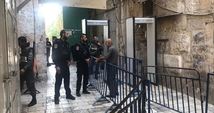
The Israeli cabinet decided on Thursday night not to remove the metal detectors newly-installed at al-Aqsa gates in total disregard to the wave of anger that is currently sweeping the Arab and Islamic world over the measure.
According to Israeli media sources, Israeli police decided on Friday morning that the metal detectors would remain in place, following overnight discussions by the Israeli security cabinet.
The overnight meeting was attended by Israeli Security Minister and Israel’s police and Intelligence services.
During the meeting, Israel's intelligence service, the Shin Bet, expressed reservations regarding the installation of the metal detectors, arguing that the anger sparked by the measure might outweigh the security benefits of keeping them.
Palestinian worshippers have been refusing to enter the holy site through the metal detectors, charging the step is an Israeli attempt to claim further control over the site.
The measure sparked daily clashes between worshippers and police, with dozens of Palestinian injuries, since last Friday.
A number of Arab and Islamic countries urged Israel to remove the gates, saying it was a violation of the long-held status quo under which the Muslim Waqf is in charge of running the holy site.
According to Israeli media sources, Israeli police decided on Friday morning that the metal detectors would remain in place, following overnight discussions by the Israeli security cabinet.
The overnight meeting was attended by Israeli Security Minister and Israel’s police and Intelligence services.
During the meeting, Israel's intelligence service, the Shin Bet, expressed reservations regarding the installation of the metal detectors, arguing that the anger sparked by the measure might outweigh the security benefits of keeping them.
Palestinian worshippers have been refusing to enter the holy site through the metal detectors, charging the step is an Israeli attempt to claim further control over the site.
The measure sparked daily clashes between worshippers and police, with dozens of Palestinian injuries, since last Friday.
A number of Arab and Islamic countries urged Israel to remove the gates, saying it was a violation of the long-held status quo under which the Muslim Waqf is in charge of running the holy site.

The Israeli occupation police on Friday started to impose tight restrictions on the entry of Palestinian worshipers to the Old City of Jerusalem as the security cabinet announced its refusal to remove the security gates at the Aqsa Mosque’s entrances.
More police forces and barriers were already deployed overnight in different areas of the holy city, especially in its Old City and around the Aqsa Mosque.
The Israeli police also prevented buses carrying Muslim worshipers from Israeli occupied areas from entering the holy city for the Friday prayer.
In a press release, the police said they increased the number of their forces in and around Jerusalem, especially in the Old City and at the Aqsa Mosque after Palestinians called for a day of anger on Friday against Israeli security measures at the Islamic holy site.
They added that all Palestinian men under age 50 would be barred from entering the Old City and the Aqsa Mosque.
More police forces and barriers were already deployed overnight in different areas of the holy city, especially in its Old City and around the Aqsa Mosque.
The Israeli police also prevented buses carrying Muslim worshipers from Israeli occupied areas from entering the holy city for the Friday prayer.
In a press release, the police said they increased the number of their forces in and around Jerusalem, especially in the Old City and at the Aqsa Mosque after Palestinians called for a day of anger on Friday against Israeli security measures at the Islamic holy site.
They added that all Palestinian men under age 50 would be barred from entering the Old City and the Aqsa Mosque.
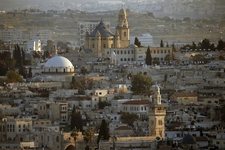
View of Jerusalem’s Old City district, seen on April 14, 2014
A bill aimed at preventing any future divisions of Jerusalem, by requiring a two-third majority in Israel’s parliament, in order to do so, passed its preliminary reading in the Knesset, on Wednesday.
The bill, titled “Basic Law: Jerusalem, the Capital of Israel,” passed with 58 Members of Knesset (MKs) voting in favor, 48 voting against it, and one MK abstaining from the vote, according to a statement released by the Knesset.
According to Ma’an, the bill aims to mend Israel’s Basic Law on Jerusalem, to necessitate the approval of 80 of the 120 Knesset members to make any changes to the law, instead of the regular majority vote.
According to the statement, the proposal explains that the bill has a “security purpose.”
“Since the IDF’s withdrawal from Lebanon [in 2000] and the disengagement from the Gaza Strip [in 2005] proved that wherever Israel withdraws from, terrorist factors enter, threatening the security of citizens of Israel,” the bill reportedly states, insinuating that if Israel withdrew from occupied East Jerusalem, it would be taken over by “terrorist” factions.
MK Shuli Moalem-Refaeli from the ultra right Jewish Home party, who had submitted the bill along with a group of other MKs, said that the bill was meant “to protect Jerusalem, the eternal capital of the Israeli People.”
“The State of Israel will not allow the establishment of a Palestinian state with Jerusalem as its capital. Get it into your heads that Jerusalem will remain the capital of the Jewish People for eternity; 3,000 years after King David established Jerusalem as the capital of the [Jewish] People, we returned to it,” she added.
The fate of Jerusalem has been a focal point of the Israeli-Palestinian conflict for decades, with numerous tensions arising over Israeli threats regarding the status of non-Jewish religious sites in the city, and the “Judaization” of East Jerusalem through settlement construction and mass demolitions of Palestinian homes.
Right-wing Israeli leaders routinely claim that Jerusalem is the “eternal capital” of Israel. However, this claim is not supported by the international community, which still largely considers occupied East Jerusalem to be an integral part of a future Palestinian state.
Meanwhile, MK Tzipi Livni from the centrist Zionist Camp noted that East Jerusalem includes “villages with hundreds of thousands of Palestinians. Police do not enter them, and neither does the education minister,” referring to right-wing MK Naftali Bennett who initially proposed the bill in June.
Livni also added that the bill would “prevent us from separating from the Palestinians.”
Bennett had said in June that the purpose of proposing the law was to “unify Jerusalem forever,” by making it “impossible” to divide Jerusalem.
While the PA and the international community do not recognize the legality of the occupation of East Jerusalem, Gaza, and the West Bank since 1967, many Palestinians consider that all historic Palestine has been occupied since the creation of the state of Israel in 1948.
Meanwhile, a growing number of activists have criticized a two-state solution to the Israeli-Palestinian conflict as unsustainable and unlikely to bring durable peace given the existing political context, proposing instead a binational state with equal rights for Israelis and Palestinians.
A bill aimed at preventing any future divisions of Jerusalem, by requiring a two-third majority in Israel’s parliament, in order to do so, passed its preliminary reading in the Knesset, on Wednesday.
The bill, titled “Basic Law: Jerusalem, the Capital of Israel,” passed with 58 Members of Knesset (MKs) voting in favor, 48 voting against it, and one MK abstaining from the vote, according to a statement released by the Knesset.
According to Ma’an, the bill aims to mend Israel’s Basic Law on Jerusalem, to necessitate the approval of 80 of the 120 Knesset members to make any changes to the law, instead of the regular majority vote.
According to the statement, the proposal explains that the bill has a “security purpose.”
“Since the IDF’s withdrawal from Lebanon [in 2000] and the disengagement from the Gaza Strip [in 2005] proved that wherever Israel withdraws from, terrorist factors enter, threatening the security of citizens of Israel,” the bill reportedly states, insinuating that if Israel withdrew from occupied East Jerusalem, it would be taken over by “terrorist” factions.
MK Shuli Moalem-Refaeli from the ultra right Jewish Home party, who had submitted the bill along with a group of other MKs, said that the bill was meant “to protect Jerusalem, the eternal capital of the Israeli People.”
“The State of Israel will not allow the establishment of a Palestinian state with Jerusalem as its capital. Get it into your heads that Jerusalem will remain the capital of the Jewish People for eternity; 3,000 years after King David established Jerusalem as the capital of the [Jewish] People, we returned to it,” she added.
The fate of Jerusalem has been a focal point of the Israeli-Palestinian conflict for decades, with numerous tensions arising over Israeli threats regarding the status of non-Jewish religious sites in the city, and the “Judaization” of East Jerusalem through settlement construction and mass demolitions of Palestinian homes.
Right-wing Israeli leaders routinely claim that Jerusalem is the “eternal capital” of Israel. However, this claim is not supported by the international community, which still largely considers occupied East Jerusalem to be an integral part of a future Palestinian state.
Meanwhile, MK Tzipi Livni from the centrist Zionist Camp noted that East Jerusalem includes “villages with hundreds of thousands of Palestinians. Police do not enter them, and neither does the education minister,” referring to right-wing MK Naftali Bennett who initially proposed the bill in June.
Livni also added that the bill would “prevent us from separating from the Palestinians.”
Bennett had said in June that the purpose of proposing the law was to “unify Jerusalem forever,” by making it “impossible” to divide Jerusalem.
While the PA and the international community do not recognize the legality of the occupation of East Jerusalem, Gaza, and the West Bank since 1967, many Palestinians consider that all historic Palestine has been occupied since the creation of the state of Israel in 1948.
Meanwhile, a growing number of activists have criticized a two-state solution to the Israeli-Palestinian conflict as unsustainable and unlikely to bring durable peace given the existing political context, proposing instead a binational state with equal rights for Israelis and Palestinians.
20 july 2017
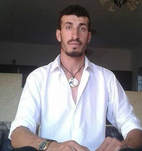
Mohmmad Hussein Tnouh 26
Israeli soldiers shot and killed, on Thursday at noon, a young Palestinian man, after he reportedly attempted to stab them, in Teqoua’ town, east of Bethlehem, in the occupied West Bank.
The Palestinian, identified as Mohmmad Hussein Tnouh, 26, was shot with four live rounds, before an army jeep ran over him, near al-Khansa’ school, in Teqoua’.
An Israeli army spokesperson said the soldiers “responded to an immediate threat, and killed the man.”
After shooting the Palestinian, the soldiers closed the area, prevented bystanders, and even medics, from approaching him, and later covered his body with a black sheet, before taking it away.
The Red Crescent said the soldiers refused to allow its medics to approach the Palestinian to assess his condition, and the extent of his injuries, before he was declared dead.
It is worth mentioning that clashes took place after Tnouh was shot dead, and the soldiers fired dozens of live rounds and rubber-coated steel bullets.
Furthermore, the Palestinian Police said the soldiers shot one of its officers, identified as Zayed Sha’er, with a rubber-coated steel bullet in the head.
The death of Tnouh brings the number of Palestinians, killed by Israeli soldiers in occupied Palestine this year alone, to fifty Palestinians, including fifteen children, and a toddler, identified as Abdul-Rahman Mahmoud Barghouthi, only18 months of age, who died, on July 7th, from the severe effects of teargas inhalation after Israeli soldiers invaded Aboud village, northwest of Ramallah, in central West Bank, and fired many gas bombs.
Ten Israelis, including six soldiers and officers, were killed since the beginning of this year; two of them were Arab citizens of Israel.
Israeli soldiers shot and killed, on Thursday at noon, a young Palestinian man, after he reportedly attempted to stab them, in Teqoua’ town, east of Bethlehem, in the occupied West Bank.
The Palestinian, identified as Mohmmad Hussein Tnouh, 26, was shot with four live rounds, before an army jeep ran over him, near al-Khansa’ school, in Teqoua’.
An Israeli army spokesperson said the soldiers “responded to an immediate threat, and killed the man.”
After shooting the Palestinian, the soldiers closed the area, prevented bystanders, and even medics, from approaching him, and later covered his body with a black sheet, before taking it away.
The Red Crescent said the soldiers refused to allow its medics to approach the Palestinian to assess his condition, and the extent of his injuries, before he was declared dead.
It is worth mentioning that clashes took place after Tnouh was shot dead, and the soldiers fired dozens of live rounds and rubber-coated steel bullets.
Furthermore, the Palestinian Police said the soldiers shot one of its officers, identified as Zayed Sha’er, with a rubber-coated steel bullet in the head.
The death of Tnouh brings the number of Palestinians, killed by Israeli soldiers in occupied Palestine this year alone, to fifty Palestinians, including fifteen children, and a toddler, identified as Abdul-Rahman Mahmoud Barghouthi, only18 months of age, who died, on July 7th, from the severe effects of teargas inhalation after Israeli soldiers invaded Aboud village, northwest of Ramallah, in central West Bank, and fired many gas bombs.
Ten Israelis, including six soldiers and officers, were killed since the beginning of this year; two of them were Arab citizens of Israel.
19 july 2017
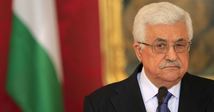
Palestinian Authority President Mahmoud Abbas turned a blind eye to the serious escalation in Occupied Jerusalem and Israel's violations at al-Aqsa Mosque and banning Jerusalemites and Palestinian worshipers from performing prayers at the holy site since last Friday.
In his 20-minute speech delivered at Chinese Academy of Governance in Beijing on Wednesday, Abbas did not mention the current situation in Occupied Jerusalem. However, he expressed his willingness to hold tripartite political meetings (Chinese, Palestinian and Israeli).
Thousands of Palestinians have been sitting in front of al-Aqsa Mosque’s gates since last Sunday in protest at installing metal detectors at the holy shrine in order to control the Muslim worshipers’ access to al-Aqsa Mosque.
Violent clashes erupted between sit-inners and Israeli police on Tuesday evening. Dozens of injuries were reported among Palestinians including preacher of al-Aqsa Mosque Sheikh Ekrema Sabri.
In his 20-minute speech delivered at Chinese Academy of Governance in Beijing on Wednesday, Abbas did not mention the current situation in Occupied Jerusalem. However, he expressed his willingness to hold tripartite political meetings (Chinese, Palestinian and Israeli).
Thousands of Palestinians have been sitting in front of al-Aqsa Mosque’s gates since last Sunday in protest at installing metal detectors at the holy shrine in order to control the Muslim worshipers’ access to al-Aqsa Mosque.
Violent clashes erupted between sit-inners and Israeli police on Tuesday evening. Dozens of injuries were reported among Palestinians including preacher of al-Aqsa Mosque Sheikh Ekrema Sabri.
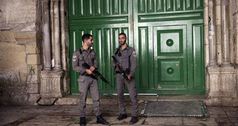
Spokesman of the Greek Orthodox Patriarchate of Jerusalem, Father Issa Musleh, said on Wednesday that the latest Israeli aggression on al-Aqsa Mosque falls in line with a premeditated plan aimed at dividing the Mosque spatially and temporally exactly like what happened to the Ibrahimi Mosque in al-Khalil.
Speaking at a press conference in the presence of Muslim and Christian clerics, Father Musleh called for launching daily demonstrations in which Muslims and Christians take part in support of al-Aqsa Mosque.
"Our churches will be open to Muslim worshipers," he said, stressing the importance of achieving national unity to be able to confront the Israeli violations.
Musleh appealed to the Muslim and Christian worlds to support the Palestinian people in Jerusalem, affirming that Christians in Palestine categorically reject the metal detectors newly set up at al-Aqsa gates.
He pointed out that any attack on the Islamic holy site constitutes an attack on the Church of the Holy Sepulchre, asking the United Nations and the Security Council to intervene to stop the Israeli violations.
He suggested sending a Jerusalemite delegation abroad to speak of the situation in Occupied Jerusalem.
Speaking at a press conference in the presence of Muslim and Christian clerics, Father Musleh called for launching daily demonstrations in which Muslims and Christians take part in support of al-Aqsa Mosque.
"Our churches will be open to Muslim worshipers," he said, stressing the importance of achieving national unity to be able to confront the Israeli violations.
Musleh appealed to the Muslim and Christian worlds to support the Palestinian people in Jerusalem, affirming that Christians in Palestine categorically reject the metal detectors newly set up at al-Aqsa gates.
He pointed out that any attack on the Islamic holy site constitutes an attack on the Church of the Holy Sepulchre, asking the United Nations and the Security Council to intervene to stop the Israeli violations.
He suggested sending a Jerusalemite delegation abroad to speak of the situation in Occupied Jerusalem.
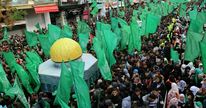
Hamas Movement in the West Bank called on the Palestinian people to participate in marches and clashes at different Israeli military barriers and flashpoints next Friday.
In a press statement on Wednesday, Hamas announced next Friday a day of anger and called for taking to the streets in support of al-Aqsa Mosque.
The event is scheduled to protest the Israeli measures and steps aimed at changing the status quo in Occupied Jerusalem and al-Aqsa Mosque.
In a press statement on Wednesday, Hamas announced next Friday a day of anger and called for taking to the streets in support of al-Aqsa Mosque.
The event is scheduled to protest the Israeli measures and steps aimed at changing the status quo in Occupied Jerusalem and al-Aqsa Mosque.
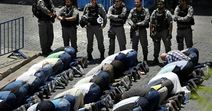
Palestinian factions and popular forces called Wednesday for a “day of rage” in light of the Israeli fierce campaign against al-Aqsa Mosque and occupied Jerusalem.
The calls came in the wake of Israeli new restrictions on Palestinian worshipers’ access to the compound.
Metal detectors were installed since Sunday at the entrances of the Mosque in order to tighten search and inspection procedures of all Palestinians wishing to enter the holy site.
The new Israeli measures sparked a wave of anger among Palestinians who continued their protests at the entrances to the holy site, refusing to enter into the compound via the detectors for the fourth consecutive day.
Mosques in occupied Jerusalem launched via loudspeakers calls for intensifying Palestinian presence near the gates.
Meanwhile, Jihad and Hamas movements called for mass marches throughout Palestinian territories and in the diaspora, stressing the urgent need to escalate the ongoing Intifada (uprising).
Fatah Movement also called for a “March of Rage” in Ramallah and Qalqilia in defense of the al-Aqsa Mosque.
Tensions are still running high in occupied Jerusalem and al-Aqsa after Israeli authorities tightened their restrictions on Palestinian worshipers’ entry into al-Aqsa, the third holiest site in Islam, following an anti-occupation shooting which left three Palestinians killed and two Israeli police officers dead.
The calls came in the wake of Israeli new restrictions on Palestinian worshipers’ access to the compound.
Metal detectors were installed since Sunday at the entrances of the Mosque in order to tighten search and inspection procedures of all Palestinians wishing to enter the holy site.
The new Israeli measures sparked a wave of anger among Palestinians who continued their protests at the entrances to the holy site, refusing to enter into the compound via the detectors for the fourth consecutive day.
Mosques in occupied Jerusalem launched via loudspeakers calls for intensifying Palestinian presence near the gates.
Meanwhile, Jihad and Hamas movements called for mass marches throughout Palestinian territories and in the diaspora, stressing the urgent need to escalate the ongoing Intifada (uprising).
Fatah Movement also called for a “March of Rage” in Ramallah and Qalqilia in defense of the al-Aqsa Mosque.
Tensions are still running high in occupied Jerusalem and al-Aqsa after Israeli authorities tightened their restrictions on Palestinian worshipers’ entry into al-Aqsa, the third holiest site in Islam, following an anti-occupation shooting which left three Palestinians killed and two Israeli police officers dead.
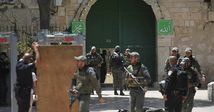
An urgent complaint was presented by the London-based Palestinian Return Centre (PRC) to the United Nations Human Rights Council in Geneva on Monday, calling for urgent intervention on Israel’s closure of holy al-Aqsa Mosque and violations of the freedom of worship.
In the memorandum, PRC sounded the alarm over Israel’s incessant violations of the freedom of worship by stepping up crackdowns on the Muslim worshipers, shutting the doors to holy al-Aqsa Mosque, and setting up metal detectors near the main entrances to the site.
PRC said it believes the measures have also affected the members of the Christian community in the West Bank and the Gaza Strip who have been banned the right to a free access to their holy sites.
PRC said such Israeli measures represent direct contraventions of the Universal Declaration of Human Rights, Article 9, which grants “the freedom to exercise religion or belief publicly or privately, alone or with others” and “the freedom to exercise religion or belief in worship, teaching, practice and observance.”
The complaint warned that the Israeli government is rapidly expanding its Judization activities in Occupied Jerusalem, desecrating the holy sites of Muslims and Christians, and boosting settler break-ins at al-Aqsa—the third holiest site in Islam.
In light of the above cited violations, PRC called on the Human Rights Council to hold an emergency meeting to discuss the situation in Jerusalem, issue an urgent statement to denounce the new Israeli measures, and take whatever necessary decisions within the Jurisdiction of the council to hold Israel to account.
In the memorandum, PRC sounded the alarm over Israel’s incessant violations of the freedom of worship by stepping up crackdowns on the Muslim worshipers, shutting the doors to holy al-Aqsa Mosque, and setting up metal detectors near the main entrances to the site.
PRC said it believes the measures have also affected the members of the Christian community in the West Bank and the Gaza Strip who have been banned the right to a free access to their holy sites.
PRC said such Israeli measures represent direct contraventions of the Universal Declaration of Human Rights, Article 9, which grants “the freedom to exercise religion or belief publicly or privately, alone or with others” and “the freedom to exercise religion or belief in worship, teaching, practice and observance.”
The complaint warned that the Israeli government is rapidly expanding its Judization activities in Occupied Jerusalem, desecrating the holy sites of Muslims and Christians, and boosting settler break-ins at al-Aqsa—the third holiest site in Islam.
In light of the above cited violations, PRC called on the Human Rights Council to hold an emergency meeting to discuss the situation in Jerusalem, issue an urgent statement to denounce the new Israeli measures, and take whatever necessary decisions within the Jurisdiction of the council to hold Israel to account.
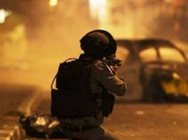
Several Israeli military jeeps invaded, on Tuesday at night, the town of al-‘Ezariyya, east of occupied East Jerusalem, and clashed with local youngsters, wounding sixteen.
The Palestinian Red Crescent (PRC) said its medics rushed to the town, and provided the needed treatment to eleven Palestinians, who suffered the effects of teargas inhalation, three who were shot with rubber-coated steel bullets and two others who suffered burns.
The Palestinian Red Crescent (PRC) said its medics rushed to the town, and provided the needed treatment to eleven Palestinians, who suffered the effects of teargas inhalation, three who were shot with rubber-coated steel bullets and two others who suffered burns.
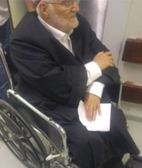
Palestinian Red Crescent (PRC) medics have provided medical treatment to 34 Palestinians, including the Khatib of al-Aqsa Mosque in Jerusalem, and moved at least fourteen others to hospitals, including one who suffered a serious injury, after Israeli soldiers attacked dozens of Palestinians in the Tribes Gate area, and Jerusalem’s Old City.
The soldiers fired dozens of gas bombs, concussion grenades and rubber-coated steel bullets at the Palestinians who gathered in the streets to perform evening prayer, after preventing them from entering al-Aqsa Mosque.
The PRC said one of the wounded Palestinians was shot with a live round in the chest, and is currently in a serious condition.
It added that the Khatib of the Al-Aqsa Mosque was shot with a rubber-coated steel bullet in the back, in addition to suffering various cuts and bruises.
The soldiers also fired a concussion grenade at a PRC ambulance, in addition to attacking medics in another ambulance.
The soldiers fired dozens of gas bombs, concussion grenades and rubber-coated steel bullets at the Palestinians who gathered in the streets to perform evening prayer, after preventing them from entering al-Aqsa Mosque.
The PRC said one of the wounded Palestinians was shot with a live round in the chest, and is currently in a serious condition.
It added that the Khatib of the Al-Aqsa Mosque was shot with a rubber-coated steel bullet in the back, in addition to suffering various cuts and bruises.
The soldiers also fired a concussion grenade at a PRC ambulance, in addition to attacking medics in another ambulance.
18 july 2017
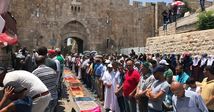
Palestinian worshipers performed their prayers outside al-Aqsa Mosque as they voiced their firm rebuff to enter the site through the Israeli metal detectors.
Dozens of worshipers rallied near the main entrances to al-Aqsa Mosque, refusing to give in to Israel’s oppressive measures.
At the same time, dozens of Israeli settlers continue to defile the site under heavy police escort, sparking tension in Occupied Jerusalem.
Dozens of worshipers rallied near the main entrances to al-Aqsa Mosque, refusing to give in to Israel’s oppressive measures.
At the same time, dozens of Israeli settlers continue to defile the site under heavy police escort, sparking tension in Occupied Jerusalem.
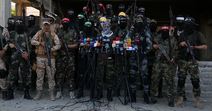
The armed wings of the Palestinian factions in Gaza warned on Tuesday of serious consequences that would ignite the region if Israel did not backtrack on its latest decisions against al-Aqsa Mosque.
The factions said in a press conference that they will respond strongly to any Israeli racist scheme targeting the holy site, stressing that Israel will pay a "high price" for any harm done to the Mosque.
They praised the steadfast Jerusalemite people, the defenders of al-Aqsa Mosque, and called on Palestinians in the West Bank and the 1948 occupied territories to intensify their presence at the Mosque and protect it by all means.
Friday prayer at al-Aqsa Mosque was banned on 14th July following a shootout between three Palestinian youths and the Israeli police in the compound. Two Israeli officers, in addition to the three Palestinians, were killed.
A decision was issued later to close the Old City of Jerusalem and ban prayer at the Mosque until further notice for the first time since 1969. On Sunday, the Israeli authorities started to reopen the site gradually after installing metal detectors at its gates which Muslim worshipers refused to pass through.
The factions said in a press conference that they will respond strongly to any Israeli racist scheme targeting the holy site, stressing that Israel will pay a "high price" for any harm done to the Mosque.
They praised the steadfast Jerusalemite people, the defenders of al-Aqsa Mosque, and called on Palestinians in the West Bank and the 1948 occupied territories to intensify their presence at the Mosque and protect it by all means.
Friday prayer at al-Aqsa Mosque was banned on 14th July following a shootout between three Palestinian youths and the Israeli police in the compound. Two Israeli officers, in addition to the three Palestinians, were killed.
A decision was issued later to close the Old City of Jerusalem and ban prayer at the Mosque until further notice for the first time since 1969. On Sunday, the Israeli authorities started to reopen the site gradually after installing metal detectors at its gates which Muslim worshipers refused to pass through.
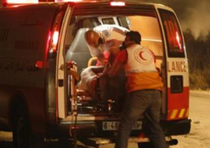
Israeli soldiers injured, on Monday evening, at least seventy Palestinians, including the Secretary-General of the Palestinian National Initiative, Dr. Mustafa Barghouthi, after the army assaulted dozens of Palestinians, among them religious leaders, in the Tribes Gate area in Jerusalem, and the al-Ezariyya town, east of the occupied city. The soldiers also abducted two Palestinians.
The soldiers used excessive force against nonviolent protesters, who marched near the Tribes Gate, leading to clashes between many Palestinian young men and the soldiers.
The Red Crescent Society said its medics rushed to the area and provided the needed treatment to fifty Palestinians, and moved 15 of them to al-Makassed hospital.
It added that the 16 Palestinians were shot with rubber-coated steel bullets, nine were injured by fragments of concussion grenades, while 25 others were assaulted by the soldiers, in addition to four of its medics who were injured while providing treatment to the wounded Palestinians.
Among the wounded Palestinians was the Secretary-General of the Palestinian National Initiative, legislator Dr. Mustafa Barghouthi, who was shot with a rubber-coated steel bullet in the head, before he was moved to the al-Makassed hospital.
The attack took place when hundreds of Palestinians, headed by the General Mufti of Jerusalem, Sheikh Mohammad Hussein, and several religious and political leaders, held evening prayers on the main road facing the Tribes Gate, after the soldiers prevented them from entering Al-Aqsa Mosque.
The soldiers fired a barrage of gas bombs, before the assaulting the Palestinians, and abducted at least two of them.
In related news, dozens of soldiers invaded the al-‘Ezariyya town, east of Jerusalem, and clashed with many local youngsters, who hurled stones on the military vehicles.
The Red Crescent said its medics provided the needed treatment to four Palestinians who were shot with rubber-coated steel bullets, 15 who suffered the severe effects of teargas inhalation, and moved one Palestinian to urgent care after he fell while the soldiers were chasing him.
The soldiers used excessive force against nonviolent protesters, who marched near the Tribes Gate, leading to clashes between many Palestinian young men and the soldiers.
The Red Crescent Society said its medics rushed to the area and provided the needed treatment to fifty Palestinians, and moved 15 of them to al-Makassed hospital.
It added that the 16 Palestinians were shot with rubber-coated steel bullets, nine were injured by fragments of concussion grenades, while 25 others were assaulted by the soldiers, in addition to four of its medics who were injured while providing treatment to the wounded Palestinians.
Among the wounded Palestinians was the Secretary-General of the Palestinian National Initiative, legislator Dr. Mustafa Barghouthi, who was shot with a rubber-coated steel bullet in the head, before he was moved to the al-Makassed hospital.
The attack took place when hundreds of Palestinians, headed by the General Mufti of Jerusalem, Sheikh Mohammad Hussein, and several religious and political leaders, held evening prayers on the main road facing the Tribes Gate, after the soldiers prevented them from entering Al-Aqsa Mosque.
The soldiers fired a barrage of gas bombs, before the assaulting the Palestinians, and abducted at least two of them.
In related news, dozens of soldiers invaded the al-‘Ezariyya town, east of Jerusalem, and clashed with many local youngsters, who hurled stones on the military vehicles.
The Red Crescent said its medics provided the needed treatment to four Palestinians who were shot with rubber-coated steel bullets, 15 who suffered the severe effects of teargas inhalation, and moved one Palestinian to urgent care after he fell while the soldiers were chasing him.
17 july 2017
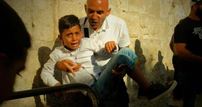
At least nine Palestinians were left wounded on Sunday evening as the Israeli occupation forces came down heavily on the peaceful Muslim worshipers outside of al-Aqsa Mosque.
According to local sources, the Israeli forces aggressively attacked dozens of Palestinians as they performed Ishaa (night) prayers near al-Asbat Gate (one of the main entrance gates of al-Aqsa Mosque).
Red Crescent paramedics said they treated nine Palestinians after the Israeli police attacked the Muslim congregation, adding that at least 17 Palestinians received treatment on the same day in such attacks near al-Aqsa Mosque.
A PIC news correspondent said violent clashes have been ongoing in Jerusalem’s Old City.
Hundreds of Muslim worshipers performed Sunday’s prayers near al-Asbat Gate, outside holy al-Aqsa Mosque, after they refused to enter the site via metal detectors set up by the Israeli forces.
On Friday, the Israeli occupation forces banned Muslim prayer at al-Aqsa Mosque—the third holiest site in Islam—following a shootout with three Palestinian anti-occupation youths. The gunfight claimed the lives of the three Palestinians. Two Israeli soldiers were pronounced dead.
According to local sources, the Israeli forces aggressively attacked dozens of Palestinians as they performed Ishaa (night) prayers near al-Asbat Gate (one of the main entrance gates of al-Aqsa Mosque).
Red Crescent paramedics said they treated nine Palestinians after the Israeli police attacked the Muslim congregation, adding that at least 17 Palestinians received treatment on the same day in such attacks near al-Aqsa Mosque.
A PIC news correspondent said violent clashes have been ongoing in Jerusalem’s Old City.
Hundreds of Muslim worshipers performed Sunday’s prayers near al-Asbat Gate, outside holy al-Aqsa Mosque, after they refused to enter the site via metal detectors set up by the Israeli forces.
On Friday, the Israeli occupation forces banned Muslim prayer at al-Aqsa Mosque—the third holiest site in Islam—following a shootout with three Palestinian anti-occupation youths. The gunfight claimed the lives of the three Palestinians. Two Israeli soldiers were pronounced dead.
